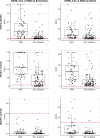Low agreement and frequent invalid controls in two SARS-CoV-2 T-cell assays in people with compromised immune function
- PMID: 39854310
- PMCID: PMC11761106
- DOI: 10.1371/journal.pone.0317965
Low agreement and frequent invalid controls in two SARS-CoV-2 T-cell assays in people with compromised immune function
Abstract
T-cell response plays an important role in SARS-CoV-2 immunogenicity. For people living with HIV (PWH) and solid organ transplant (SOT) recipients there is limited evidence on the reliability of commercially available T-cell tests. We assessed 173 blood samples from 81 participants (62 samples from 35 PWH; 111 samples from 46 SOT recipients [lung and kidney]) with two commercial SARS-CoV-2 Interferon-γ (IFN-γ) release assays (IGRA; SARS-CoV-2 IGRA by Euroimmun, and IGRA SARS-CoV-2 by Roche). The reliability between the tests was judged as low (Cohen's kappa [κ] = 0.20; overall percent agreement [OPA] = 66%). A high proportion of tests were invalid (22% Euroimmun; 8% Roche). When excluding these invalid tests, the agreement was higher (κ = 0.43; OPA = 90%). The low reliability between the two T-cell tests indicates that results should be interpreted with caution in SOT recipients and PWH and that SARS-CoV-2 T-cell tests need to be optimized and further validated for use in vulnerable patient populations.
Copyright: © 2025 Audigé et al. This is an open access article distributed under the terms of the Creative Commons Attribution License, which permits unrestricted use, distribution, and reproduction in any medium, provided the original author and source are credited.
Conflict of interest statement
Benjamin Speich and Matthias Briel received unrestricted grants from Moderna (2021/22) for the conduct of the COVERALL-2 and COVERALL-3 study. Heiner C. Bucher received in the 36 months prior to the submission of this manuscript one grant from Gilead that was not related to this project. Heiner C. Bucher served as the president of the ‘Association contre le HIV et autres infections transmissibles’ until June 2022. In this role he received support for the Swiss HIV Cohort Study from ViiV Healthcare, Gilead, BMS, and MSD. Alexandra Trkola received unrestricted research funding from the Swiss National Science Foundation, the Swiss HIV Cohort Study, Gilead Sciences and Novartis not related to this study. Dominique L. Braun received honoraria for advisory boards from the companies Gilead, MSD, Pfizer, AstraZeneca and ViiV outside of the study. Irene A. Abela received a research grant from Gilead sciences and honoraria for advisory boards from the companies Moderna and AstraZeneca. Huldrych F. Günthard, outside of this study, reports grants from the Swiss National Science Foundation, National Institutes of Health (NIH), and the Swiss HIV Cohort Study, unrestricted research grants from the Bill and Melinda Gates Foundation, Gilead Sciences, ViiV Healthcare and Yvonne Jacob Foundation, personal fees from consulting or advisory boards or data safety monitoring boards for Merck, Gilead Sciences, ViiV Healthcare, Janssen, Johnson and Johnson, GSK and Novartis. Huldrych F. Günthard’s institution received money for participation in the following clinical COVID-19 studies: 540-7773/5774 (Gilead), TICO (ACTIV-3, INSIGHT/NIH), and the Morningsky study (Roche). DLB reports honoraria for advisory boards, lectures, and travel grants from the companies Gilead, MSD and ViiV outside of the submitted work. Nicolas J. Mueller reports honoraria for advisory boards and travel grants from the companies Gilead, Biotest, Takeda outside of the submitted work. Roger D. Kouyos reports grants from the Swiss National Science Foundation, National Institutes of Health (NIH), the Swiss HIV Cohort Study, and Gilead Sciences (all outside of this study). All other authors have declared that no competing interests exist.
Figures

References
-
- Speich B, Chammartin F, Smith D, Stoeckle MP, Amico P, Eichenberger AL, et al. A trial platform to assess approved SARS-CoV-2 vaccines in immunocompromised patients: first sub-protocol for a pilot trial comparing the mRNA vaccines Comirnaty(R) and COVID-19 mRNA Vaccine Moderna(R). Trials. 2021;22(1):724. Epub 2021/10/23. doi: 10.1186/s13063-021-05664-0 ; PubMed Central PMCID: PMC8529365. - DOI - PMC - PubMed
-
- Koller MT, van Delden C, Muller NJ, Baumann P, Lovis C, Marti HP, et al. Design and methodology of the Swiss Transplant Cohort Study (STCS): a comprehensive prospective nationwide long-term follow-up cohort. Eur J Epidemiol. 2013;28(4):347–55. Epub 2013/04/03. doi: 10.1007/s10654-012-9754-y ; PubMed Central PMCID: PMC3653038. - DOI - PMC - PubMed
MeSH terms
Substances
LinkOut - more resources
Full Text Sources
Medical
Miscellaneous

